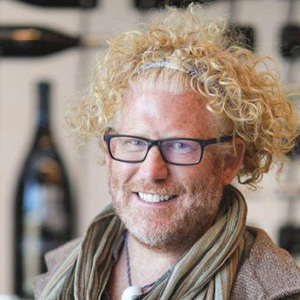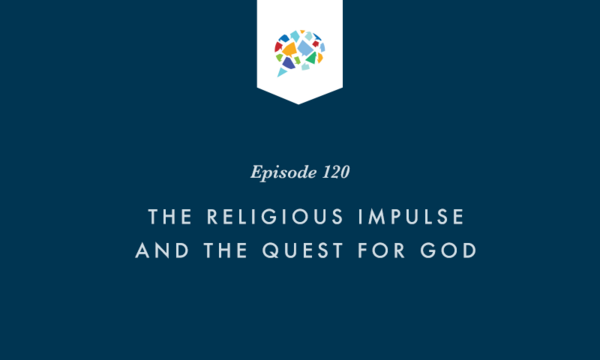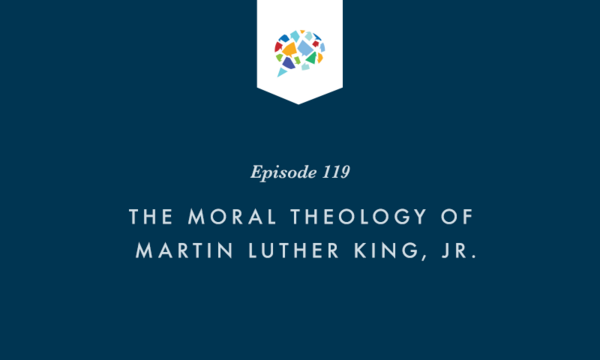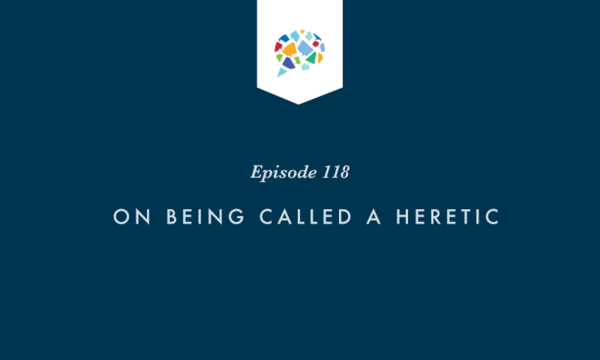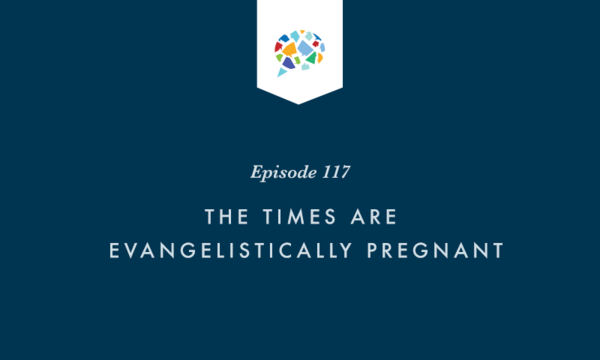
Stephen Lloyd-Moffett, professor of Religious Studies at California Polytechnic State University in San Luis Obispo, CA, is also a campus moderator for the Veritas Forum, a non-profit organization that seeks to help students on college campuses explore truth in dialogue across religious beliefs. On today's episode, Tim, Rick and Stephen consider: What makes for a good moderator when disagreement pops up? And how do you keep the relationship in tact when a pointed and meaningful disagreement occurs? They discuss the importance of building muscle for inquiry and learning how to use educational environments to challenge and strengthen faith convictions. Tim and Rick also ask Stephen about the perceptions of evangelicals on the campus.
Transcript
Rick Langer: Welcome to the Winsome Conviction Podcast. My name's Rick Langer. I'm a professor emeritus at Biola University. I'm also the co-director of the Winsome Conviction Project, and I'm here with my good friend Tim Muehlhoff. Looking forward to very interesting conversation today, Tim.
Tim Muehlhoff: Yeah. Sometimes we have guests in the past, that the conversation was just so thoughtful, that we thought, "Boy, we need to have them back." And so we are delighted that Dr. Stephen Lloyd-Moffett, a professor of Religious Studies at Cal Poly, San Luis Obispo, has agreed to come back. If you've not listened to the original conversation, go ahead and go do that. These two won't necessarily be linked to each other, but absolutely go back.
Dr. Moffett has some fascinating thoughts about our religious journey, and he got a chance to share his own journey and how that started, and led to a career of being a professor. I originally met Dr. Moffett through something called The Veritas Forum. This is a wonderful forum that started at Harvard, where they go to different universities and bring together people with different perspectives around religious issues. And I got invited to do the one with Elizabeth Barrett. She's a psychologist, host of The Reluctant Therapist, and that's where I met Dr. Moffett.
He moderated, did a great job. So, Stephen, welcome so much, back to our program. Thank you for doing this again.
Stephen Lloyd-Moffett: Yeah, thanks for having me. We were theological last time, and now, we'll get more practical theology in there.
Tim Muehlhoff: Yeah, hopefully. Hey, can we start with just asking, because you're a very busy person, your resume is amazing to look at, "Why do you take time for The Veritas Forum because you've ... Haven't you moderated, I think two or three or four of these?
Stephen Lloyd-Moffett: Yeah.
Tim Muehlhoff: Why take time to do it, and what's your understanding and appreciation of The Veritas Forum?
Stephen Lloyd-Moffett: Yeah. I think I've done a dozen of them almost from the beginning. It's in different forms, not always the large venue. But, I mean, for the most part, The Veritas Forum has been an opportunity for people of conviction to share a stage together and speak about things that matter, and for my students, I think sort of witnessing people who are thoughtful people and haven't always come to the same conclusion about life, or about what's important, but they're thoughtful people, and seeing those ... Not necessarily competing, but seeing those positions side by side on the stage and watching thoughtful people dialogue is a real gift to the students, because frankly, very little meaningful dialogue is often out there for them to witness.
Tim Muehlhoff: And, you know, Stephen, in today's argument culture, that is no small thing, to watch people who do have differences, but do it in a cordial, inviting way that promotes curiosity, because I really did like Elizabeth. She was absolutely delightful. We had a chance to have dinner before we actually did The Veritas Forum, and it was really fun to share the stage, and that's why she called me later and said, "Let's continue this on my radio program." So we did about an hour on her radio program, continued. And I really felt that connection with you.
So I think, what a gift to students to say in the midst of the argument culture, the relational level of communication is really important, and that's one of the things I greatly value about The Veritas Forum. But as moderator, can you give us some insight into what makes a good moderator, and how do you navigate this conversation between people who do come from often different viewpoints, or convictions, or worldviews?
Stephen Lloyd-Moffett: Yeah. I mean, so oftentimes, when you're moderating, I think, or even just engaged in conversations that can be challenging, you're there, knowing that you're different, or quickly discover you're different. But I like to sort of peel back and say, "What are some fundamental ways you see the world? What are some things that we can agree upon?," and then build from there. And sometimes the only thing you can agree on is, "Boy, you should love your mother."
Okay, great. There's a start. Let's build from that.
Tim Muehlhoff: Yeah.
Stephen Lloyd-Moffett: And so let's find the things that we agree to, because I think so often, our culture, what people do is find the differences, and then pound on those differences, and rarely is that a productive conversation or a meaningful one. And I think it only highlights the differences, where so oftentimes, we actually share some fundamental ways of seeing the world, even if we don't always come to the same conclusion.
Rick Langer: I really want to pick up on that very issue with ... Because we spent a lot of time talking about conviction, and how convictions are formed, and how to have well-formed convictions, poorly-formed convictions. Sometimes I call them half-baked convictions. By that, I don't mean they're half-baked, in the sense of being silly, but they're only half-thought through. They haven't been in the oven long enough.
There's nothing wrong with your banana bread, you just need to put it back in. And I think one of the things that helps us cook our convictions, so to speak, is talking to people who see it differently. And that doesn't mean our conviction has to be abandoned, but you can just have a person ask you one question, and you're sitting like, "Wow, I never thought of that, and how does that fit in?" And I think sometimes you end up finding things that are much deeper and richer about your own beliefs simply because somebody probed someone that you'd kind of been blind to it even being there. So anyhow, I appreciate that.
Stephen Lloyd-Moffett: I totally agree. One of my longest and best friends is a very conservative constitutional law professor at Notre Dame. And we end up often on different landing points in the end, but I would rather talk to him than just about anyone on political issues because we think things through really deeply, that it almost always comes to some moment in our conversation, where we get to a fundamental observation of human life that we disagree with, and we really sort of bring it back down to, "Okay, this is why we disagree on this political issue, or this policy solution, or this theological issue," because in the end, we've identified together something that is foundational that will then lead to the later disagreement. And so I can say after we talk, that Phil and I, we understand each other. And it doesn't mean that we agree with each other, but we really, at the end of a conversation, we understand each other.
And those are the most useful conversations because he helps me see the assumptions that I bring into discussions, and I hope that I help him see the assumptions that he brings into his analysis.
Tim Muehlhoff: Can you unpack that? I'm thinking of a survey we often quote, where 33% of the respondents said, "I no longer talk to a family member because we have deep disagreements about political issues." So can you unpack just with Phil? What is it that protects it? Like when you do have these fundamental policy disagreements or seeing a particular social issue very differently, what's the secret sauce that makes that relationship work with Phil, rather than you guys just deciding, "Hey, we're going to go our separate ways. This just isn't going to work anymore"?
Stephen Lloyd-Moffett: Yeah. I mean, part of it's the longevity. We've been doing this since we were in college. Some of my fondest memories in college is the two of us and another guy. And we were college students.
Phil has always been quite conservative. And Dom, on the other side, went on to be the editor of the Encyclopedia of Homosexuality, is a very liberal professor. The three of us, none of us knew we were going to be professors, but we-
Rick Langer: That sounds like the beginning of one of those jokes about three people walking into a bar.
Stephen Lloyd-Moffett: Yeah. And I always was in the middle, sort of translating Dom to Phil, and Phil to Dom. And so we've been doing it a long time, which I think is part of the magic. But also, the other thing is I very much respect Phil as a thoughtful thinker. I mean, I don't agree with all of his leaps of logic, I don't agree with all of his assumptions, but I know that he is not flippant, he's not casual.
He's a careful thinker. And so I don't think I've ever said, "Well, that's just silly." You know? I could say, "I don't think that follows from the premises you've just given," but he's never silly. He's never unserious.
And so there's a profound respect for the way he thinks through questions, even if we don't always come to the same conclusions. And so I think beginning with the assumption that the person on the other side is not evil, they're not dumb, they are people who have been thoughtful in their responses. And bringing back to Veritas, my years of moderating Veritas, I've never lacked respect for the people on the stage. They are thoughtful people, and that's why I tell my students is, "Look, I'm at a public university. I'm not here to embolden your faith, but I also take very seriously that I am not there to harm your faith either."
I am to aspire to be neutral on that question. It is a public university, but I will count the class as a success if you come out a thoughtful person. Know what you believe and why. Articulate it clearly. Don't go through life just sort of accepting everything that's been passed your way uncritically, but think through things for yourself. And if you come to conclusions that are different than mine and you're thoughtful, that's all I can ever hope as a professor.
I want to create people, thoughtful citizens of our country, and of our world, and of our faiths, or lack of faith if that's where they end up, but I don't want you to go through life never being a thoughtful person.
Tim Muehlhoff: Wow. Could you actually hear me pounding the table, Stephen? Was that coming through the microphone when you were saying that? Rick, let me point out one thing real quick now. I'll let you jump in.
So, Stephen, what really struck me ... And again, I'm a communication professor, specifically specializing in conflict resolution, is I think we've stopped affording people goodwill.
Stephen Lloyd-Moffett: Yeah.
Tim Muehlhoff: I think we've stopped somewhere along the way, we have stopped thinking the best about people. I just did this thing at Biola University, where we interviewed Dr. Chris Brooks, talking about Martin Luther King Day, the observance of it, and it struck me again when I read Letter from a Birmingham Jail. In the very beginning of it, he says, "Usually, I do not respond to criticism." He's talking about these nine or 10 white clergy, who are saying, "Don't come to Birmingham with your nonviolent movement." And he said, "But because you are men of good faith," and I believe these criticisms are sincere, "I'm going to respond."
And I thought, "Man, we've lost that. Somewhere along the way in our political discourse, our social religious discourse, we stopped affording goodwill to people." So when I heard you say that, I really resonated with that.
Stephen Lloyd-Moffett: Yeah. I mean, I see this in play out in a lot of ways. There was a poll some years ago that 60% of Americans couldn't think of one good thing to say about Islam.
Tim Muehlhoff: Oh.
Stephen Lloyd-Moffett: And I'm just like, "Really, you can't think of one good thing? I mean like they teach you to love your mother? I mean, you can't come up with one charitable thing to say about the second-biggest religion in the world?" And I feel that's indicative of what you're talking about, Tim. We just have lost this presumption, that the person across the conversation is not a person who wants good in the world, who aspires to understand, who wants to move towards truth of some kind. I think that presumption has been just lost so often.
Rick Langer: We seem to have a, kind of a totalizing turn that captures it. So if the person's on the opposite side of whatever the controversy is, everything about them is bad. I think psychologists called it splitting. And I feel like that's become characteristic, to put a lighter tone on it. So I live now in Denver.
I spent a lot of time in California, but I grew up in Colorado, and so I'm a Denver Broncos fan since I knew there was football. And the flip side of that is I simply hate the Oakland Raiders, and they can't be beaten badly enough by another team to make me feel happy enough to accommodate my hatred, you know? And they don't have a good court. They don't have anything good about them. I mean, that sentiment.
And the good news with things like that is we kind of say that half tongue-in-cheek. It reflects an attitude. You can get Tim going on Michigan and Ohio State if you want, but that phenomenon is one thing when you have it kind of in a stylized form with football teams or whatever your favorite ... It could be a food. I'm vegan, and you're eating barbecue all the time.
But it's different when another human soul is at stake. And to do that kind of splitting for them, everything about them is bad. It kind of takes my breath away to think, "What are you saying about a person who's actually made in the image of God, bears the image of God, and you can find nothing good about them?" And I might add, even the Muslim person, who I think Christians are still supposed to believe, are made in the image of God. I mean, we need to try harder if we can't find something.
And I think part of the worry is if you admit something, you've somehow magically admitted everything. Now, there's no difference, now, there's no distinction, and I'm like, "Boy, that totalizing, splitting thing is really, really destructive to community."
Stephen Lloyd-Moffett: And I would add, Rick, it goes on all sides of the conversation, because my friends who are sort of evangelical underĚŇ»¨ĘÓƵ atheists, who's a ... There's a big chunk of that. They just can't find anything good about religion. And I'm like, "Really, nothing?" And Sam Harris, at one point, gets asked if, "Is there any difference between Mother Teresa and Hitler or somebody horrible?," and he says, "Nope. Nope."
"Mother Teresa's diluted." I'm like, "Come on." You're like, "I don't care." I mean, you've got to recognize the goodness of others. You have to find ...
And this totalizing view of the other is just so unproductive. I think it's just, it's not fruitful to mutual understanding.
Tim Muehlhoff: Do you not think, Stephen, this is fear-driven in part? So in my introduction, the Communication Theory class, students read the Quran cover to cover in my class. And you should see, Stephen, the reaction and the reaction of their parents, I might add, when they see on the list of textbooks the Quran. They're all just a little bit freaked out, and I've had parents call and say, "Look, I did not send my daughter to the Bible Institute of Los Angeles to read the Quran."
Stephen Lloyd-Moffett: Yeah.
Tim Muehlhoff: So do you think it's fear-driven a little bit?
Stephen Lloyd-Moffett: Yeah. I mean, it's funny, I have an assignment in one of my classes where they can choose to use the Hebrew Bible, the New Testament, or the Quran, but they have to write two papers, one of which says, "God requires violence in His name based on the scripture," and the other one says, "God requires complete non-violence using the scripture," and they have to write both papers from the same source. And I had a student go to his pastor and be like, "Okay, I have to write an essay, saying that God requires violence," and the pastor just gets on the phone and calls me and says, "What's wrong with you, assigning this?" Because I understand the pedagogy of it, but I think that there is this sort of fear that, "If I'm exposed to an argument, I'm going to be lured away from my conviction," and I just don't believe that that's the case. I mean, one of the things, Jamey Pappas, who is the Cru director on our campus for 20 some-odd years, one of the things he has really installed in the Cru students on campus ...
Or for those who don't know, a Cru is a Christian group, used to be called Campus Crusade for Christ, but one of the things Jamey always says is, "If what I believe is true, it can withstand any scrutiny." And that means you don't have to be afraid of the counterargument. Like no, you can trust, that if what we believe is true, it can withstand any scrutiny. And so I think you're right, there is this sort of fear. I mean, I've read ...
I've figured out I've had 5,900 students roughly in my 20 years, and they all have to write a spiritual autobiography.
Tim Muehlhoff: Wow.
Stephen Lloyd-Moffett: And so I've read literally thousands. And one of the things, and this might be interesting to some of your listeners, one of the things that I, a pattern I get all the time is, "My parents sent me to an evangelical high school, then I came to Cal Poly." And almost the sentence after that guaranteed is, "Wow, I realize there's so much more of the world, and I lost my faith," or, "I began to challenge my faith. I was with strength." And then, usually it's, "Well, now that I'm a junior or a senior, I'm sort of rediscovering, I'm going back."
And it's like this idea that you have to shelter your students, or shelter our friends and family from ideas, I think just so often comes back to haunt people, is like, "We need to teach people how to engage with ideas, engage with ideas that maybe don't always agree with my ideas, and understand why we as a family, or we as a cohort have decided not to embrace this," because just hiding from ideas just leads to this fear of the other side, and then you lack the understanding.
Rick Langer: Yeah. This would be a great thing to pursue, but one of the things that Tim and I have talked a little bit about, that we would love to get some feedback from you, you live on a college campus there at Cal Poly, San Luis Obispo, that has a huge number of very active evangelical students in a variety. It's not just Cru, InterVarsity's there. There's, I think, a separate large church that has a movement. You know probably better than I know.
There's a lot of evangelical students there. One of the things, I assume, that you've had plenty of interactions with evangelicals, both as students, and then also with the public speaking, other things that you do, I just wonder if you could give us a little insight into how we sometimes come across things that you might say, "Hey, this might be better." So any thoughts on that?
Stephen Lloyd-Moffett: Yeah. I mean, one of the things that I want to point out, when I first came to Cal Poly in 2005, in that first autobiography question is, "What role has religion played in your life?" And one of my first answers was, "Religion has played no role in my life. I'm a Christian." And I was like, "What?"
This just struck me as confusing. And I came to realize this religion gets coded as a series of senseless rituals that, as human and origin. Okay, fine. So I get that. But then, what I've seen more recently over the last decade is I'm not a Christian, I'm a follower of Jesus, because Christianity has become to be so toxic, as a concept for many of our students.
Christianity now has been a political statement in many of their minds, and they don't want the conversation to be, "Hey, I'm a Christian." "Oh, so you support Trump and X, Y, and Z." And they're like, "No. I want the ..." I don't want to be judgmental.
The people who, I think, would be aspiring towards a more authentic path would say, "I don't want to talk about politics and my faith, I want to talk about my faith." And the Christian label is a barrier to that, at least on our campus. And so I want to talk about Jesus. I want to talk about the Jesus I know, not about the Jesus that's been appropriated by politics. And so one of the more vibrant ministries on campus is Front Porch, which the students don't know it, but it's actually funded by the Presbyterians, and it's just a coffee shop.
Happens to be across the street from the Newman Catholic Center, but it's right off-campus, and you go in and they just give free coffee. And yes, they have a weekly sort of meeting, but there's very little overt Christianity on the walls. And I think it's, in part, vibrant because it is seen as the sort of ... The initial face of it is, "Hey, it's run by a bunch of people who care about you and want to get to know you." And when people say, "Why are you this way?," they're the first to acknowledge Christ is their inspiration.
Christ is the reason for how they're acting. But I think the exterior of Christianity in America right now has sadly become a barrier for many of my students to know who Jesus is.
Tim Muehlhoff: I love that idea of the coffee shop idea. Again, this is another thing I think we've lost a little bit, is we just don't come in contact with people who challenge our perspective. This tribalism idea, I think has really taken root, and we just don't do it. We just don't ... And people say, "Well, Biola University, I bet you guys are a bubble. All of you are evangelicals."
Well, evangelicals really disagree about a lot of things, but I was part of Cru at Eastern Michigan University, and it'd be very easy just to talk to fellow like-minded Cru students, even though I'm in a class with people who think very differently. So it's more of an attitude than I think proximity, is I want to be the kind of person who engages, who has that coffee with a person and ask good questions and have curiosity. So can I ask real quick, in your classroom, do they just feed off of your inquisitiveness, your curiosity, and the way that you talk about other religions, as well as Christianity? Are you kind of modeling that to the students to, "This is going to be the communication climate of the class"?
Stephen Lloyd-Moffett: Yeah. I mean, one of the things I say is, "As a public university, I'm not here to lead you to any religious conclusions. I'm also not here to lead you away from any religious conclusions." And so I take that role of neutrality or aspiration of neutrality very importantly in that. But I also tell them that why I'm not going to answer the questions if there is a God, and if so, what is he or she or they like, I do want to stress that's an important question.
I just can't answer it for you in this context. And so we can dedicate together to having deep conversations about what we can talk about in class, which is the history or what our fellow humans have believed. And so I frame it as, "Let's try to understand our neighbors, because our neighbors are Christians, our neighbors are Muslims, our neighbors are Jews, our neighbors are atheists. And so let's, together, be on a project to understand them." And if we are on that project together of trying to understand the people that we share the planet with, well, then we will also come to understand ourselves in new ways, because they're probably asking questions that I've never thought of.
And so inevitably, that's going to rebound onto me, and trying to help me have a more thoughtful and reflective approach to life. But the goal of my classes in the humanities is to study other humans, and that's the framework with which we have to work. It's interesting, I teach a class called Jesus, the class, and it's a historical Jesus class. And at different times over the past decade of teaching, it's been one of the biggest classes on campus. And one of the things that I tell the students is, "Look, we are here to understand everything that we can know as historians, but that doesn't mean that we understand Jesus."
"We understand things through the limits of history. And so if there is a debate among historians, we need to understand both sides of it and do our best to sort of present all the evidence to do it, because we don't want to hide from anything." And so I promise them that their faith will change, because inevitably, new information changes things. The direction of that change is up to them. I'm not there to disparage their faith in any way.
I'm also not consciously trying to build up their faith. I'm just trying to be fair, and I only ask them to know all the arguments, positive and negative, towards whatever part of the historical Jesus we're studying. And it's been an interesting journey, teaching that class, because I think, especially some of the evangelical students start off being very distrusting, like, "Oh, I must be there to tear down Jesus," and they'll bring their Bibles, and they'll check my translations, being like, "Hmm, I'm sure he's going to manipulate a translation." I'm like, "No." They ask questions, they're like, "Well, and John 1:4," and I'll be like, "Oh."
And then I'll tell them it is, because I know the Bible really well. I'll finish the quote for them, or tell them the quote in Greek, to be like, "No, I'm not hiding anything. I'm not here to do so. We're all on the same team here. We are trying to understand within the confines of the public university and what we can study, but we're all on the team to try to understand it." And so building that community of inquiry and being genuine in our impulse to try to understand others, I think has been helpful in having those conversations.
Tim Muehlhoff: And that goes back to the Cru director's comment, when he said, "Look, if my convictions are firm, well-reasoned, then I don't have anything to worry about inquiry." What a nice, fresh take, and probably a good place to end this, Rick. So, Stephen, thank you so much for a lifetime of study on this issue, and I think being a great example as a moderator, as a professor of how we can develop that muscle of inquiry, asking the hard questions, and you're not attacking a person's faith, but you are probably using the classroom as a laboratory and challenging certain things, giving certain information out there. So thank you so much for agreeing to take some of your time, and come back on a second time on the Winsome Conviction Podcast.
Stephen Lloyd-Moffett: All right. Well, thank you so much for having me and being able to, encouraging a bunch of perspectives on important issues.
Tim Muehlhoff: Well, we really appreciate it. Thank you.
Rick Langer: And I'd like to thank all of our listeners as well. Would encourage you to come and check us out on the winsomeconviction.com website, especially subscribe to our podcast on Apple Podcasts, Google Play, Spotify, wherever you get your podcasts, and we'd love to have you sign up for our mailing list, quarterly newsletter, and would love to hear from you. You can, would love to have questions or think you'd like us to talk about, convey that to us if you find an opportunity to do all that on our website. But thanks so much for joining us for this episode.
 Biola University
Biola University

